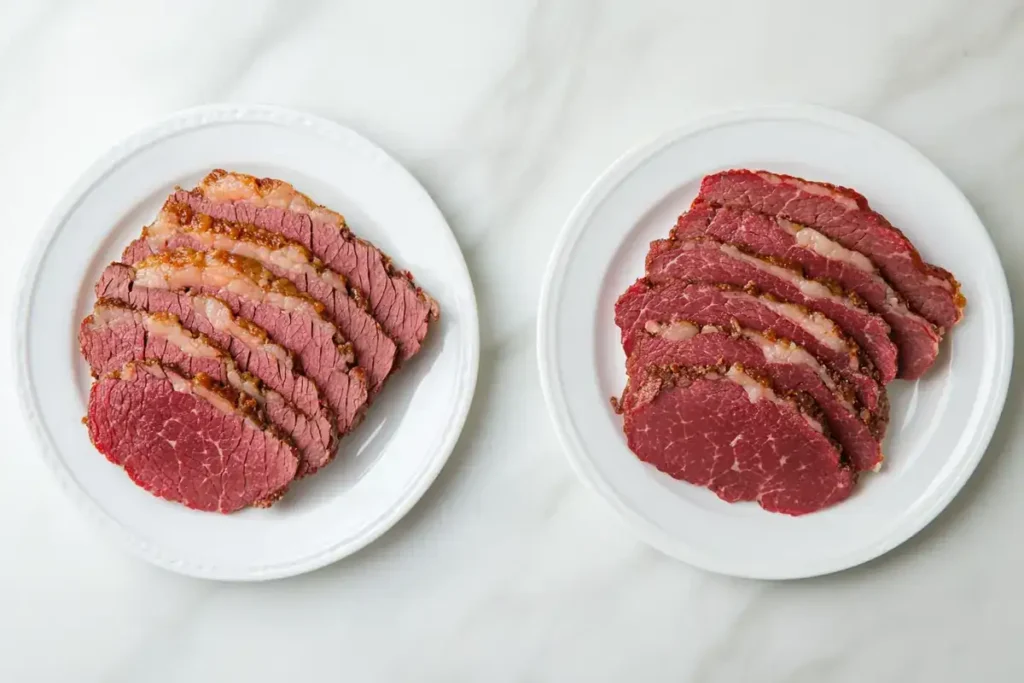Is Canned Corned Beef Healthy? Exploring Benefits and Risks
Canned corned beef is a staple for many households, thanks to its convenience, versatility, and long shelf life. Whether you enjoy it as a quick protein-packed meal or incorporate it into hearty recipes, it’s a go-to choice for countless families. However, questions about its nutritional value and potential health impacts often arise. Is canned corned beef healthy? This article dives deep into its nutritional profile, health benefits, potential drawbacks, and how to enjoy it as part of a balanced diet.
What is Canned Corned Beef?
Defining Corned Beef
Corned beef refers to a salt-cured beef product often enjoyed in both fresh and canned forms. Traditionally, the curing process involves large-grain rock salt, or “corns” of salt, giving it its name. The canned variety offers convenience and a longer shelf life, making it a popular pantry item.
How Canned Corned Beef is Made
Canned corned beef is typically made from cuts of beef that are seasoned, cured, and cooked before being sealed in cans. The curing process often involves salt, sodium nitrate, and other preservatives to enhance flavor and maintain freshness. These elements contribute to its signature salty taste and soft, moist texture.
Why People Choose Canned Corned Beef
Many people turn to canned corned beef for its ease of preparation and versatility. Whether it’s used in sandwiches, paired with vegetables, or incorporated into soups, this ready-to-eat product saves time and effort. Additionally, it’s a budget-friendly option that can be stored for long periods without refrigeration, making it ideal for emergencies or quick meal solutions.
In the next section, we’ll explore the nutritional content of canned corned beef, diving into its benefits and potential drawbacks to help you make an informed decision about its place in your diet. Let’s unpack the facts!

Nutritional Profile of Canned Corned Beef
Calories and Macronutrients
Canned corned beef is rich in protein, making it a good option for people looking to meet their daily protein intake. A typical 100-gram serving contains approximately:
- Calories: 250-300 kcal
- Protein: 12-14 grams
- Fat: 18-20 grams
- Carbohydrates: 0-2 grams
Its high protein content supports muscle maintenance and repair, while the minimal carbs make it suitable for low-carb diets.
Micronutrient Content
Canned corned beef also provides several essential vitamins and minerals, including:
- Iron: Important for oxygen transport in the blood.
- Zinc: Supports the immune system and wound healing.
- B Vitamins (especially B12): Crucial for energy metabolism and neurological health.
While these nutrients are beneficial, the sodium content is a point of concern, with a single serving often containing over 800 milligrams—approximately 35% of the recommended daily limit.
Comparison to Other Protein Sources
Compared to fresh meats, canned corned beef is higher in sodium and fat due to the curing process. While it offers convenience, it’s less nutrient-dense than lean meats like chicken or fresh fish. For a more balanced diet, consider pairing it with vegetables or whole grains to offset some of the sodium and fat.
Health Benefits of Canned Corned Beef
Convenience for Busy Lifestyles
One of the main advantages of canned corned beef is its convenience. It’s precooked, requiring minimal preparation, making it an excellent option for quick meals. Whether you’re crafting a sandwich, adding protein to a salad, or preparing a hash, canned corned beef is a versatile ingredient.
Rich in Protein
Protein is essential for muscle repair, immune function, and overall body maintenance. The protein content in canned corned beef can help you meet your daily requirements, particularly if you have a busy lifestyle that demands fast, easy meal solutions.
Long Shelf Life
Canned corned beef has a long shelf life, making it a practical choice for emergencies or pantry stocking. Unlike fresh meat, it doesn’t require refrigeration until opened, which is beneficial for camping trips or power outages.
Cultural and Culinary Versatility
Canned corned beef plays a significant role in various cuisines worldwide. From corned beef hash in the U.S. to Filipino corned beef stew, it adapts to diverse recipes. This versatility allows it to fit into a variety of dietary traditions and meal types.
In the next section, we’ll examine potential drawbacks and health concerns associated with canned corned beef. While it offers convenience and nutrition, there are considerations to keep in mind to ensure it fits into a healthy lifestyle.
Health Concerns Associated with Canned Corned Beef
High Sodium Content
One of the primary health concerns with canned corned beef is its high sodium content. A single serving can contain up to 800 milligrams of sodium, which is over one-third of the daily recommended intake. Consuming too much sodium can lead to issues such as:
- Increased Blood Pressure: Excess sodium can raise blood pressure, increasing the risk of heart disease and stroke.
- Fluid Retention: High sodium levels may cause water retention, leading to bloating and discomfort.
For those monitoring their sodium intake, it’s advisable to pair canned corned beef with low-sodium sides like fresh vegetables or brown rice.
Saturated Fat Levels
Canned corned beef is also relatively high in saturated fat, which can contribute to elevated cholesterol levels if consumed in excess. While fat is an essential nutrient, it’s important to balance your intake with healthy fats from sources like nuts, seeds, and avocados.
- Tip: Opt for smaller portions of canned corned beef and complement it with heart-healthy foods to reduce the overall saturated fat impact.
Preservatives and Additives
As a processed meat, canned corned beef often contains preservatives like sodium nitrite. While these additives help extend shelf life and maintain flavor, consuming them frequently has been linked to potential health risks, including an increased risk of certain cancers. Moderation is key to enjoying canned corned beef without overexposing yourself to these additives.

How to Incorporate Canned Corned Beef into a Balanced Diet
Pairing with Nutrient-Dense Foods
To make canned corned beef part of a balanced diet, it’s essential to combine it with nutrient-dense ingredients. For example:
- Add steamed or roasted vegetables like broccoli, carrots, or green beans to your meal.
- Serve it alongside whole grains such as quinoa, brown rice, or barley to increase fiber content.
These pairings help offset the higher sodium and fat levels in canned corned beef, making the overall dish more nutritious.
Portion Control and Moderation
Portion control is critical when incorporating canned corned beef into your diet. A serving size of 3-4 ounces is sufficient to enjoy the flavor without overindulging in sodium or fat. Eating canned corned beef occasionally, rather than as a staple, allows you to savor its taste while maintaining a healthier overall diet.
Creative Recipe Ideas
Canned corned beef can shine in a variety of dishes, adding flavor and protein. Here are a few ideas:
- Corned Beef Hash: Combine diced potatoes, onions, and bell peppers with canned corned beef for a hearty breakfast or brunch option.
- Corned Beef Stir-Fry: Sauté canned corned beef with mixed vegetables and a splash of low-sodium soy sauce for a quick, flavorful meal.
- Corned Beef Sandwiches: Pair thinly sliced canned corned beef with whole-grain bread, lettuce, and mustard for a balanced lunch.
For more delicious recipes, check out our recipe article featuring creative ways to cook with canned corned beef.
In the next section, we’ll provide a detailed recipe using canned corned beef, perfect for those looking to try this ingredient in their home cooking. Stay tuned for an easy, flavorful dish that highlights its versatility.
A Simple Recipe Using Canned Corned Beef
Ingredients You’ll Need
To create a delicious meal featuring canned corned beef, gather the following ingredients:
- 1 can (12 oz) of corned beef
- 3 medium potatoes, peeled and diced
- 1 medium onion, finely chopped
- 1 green bell pepper, diced
- 2 cloves garlic, minced
- 2 tablespoons olive oil
- 1 teaspoon paprika
- Salt and pepper to taste
- Fresh parsley for garnish
Step-by-Step Cooking Instructions
- Prepare the Potatoes
Start by boiling the diced potatoes in salted water until tender, about 8-10 minutes. Drain and set aside. - Sauté the Aromatics
Heat olive oil in a large skillet over medium heat. Add the chopped onion, garlic, and green bell pepper, cooking until softened and fragrant, about 5 minutes. - Add the Corned Beef
Break the canned corned beef into chunks and add it to the skillet. Stir well to combine with the sautéed vegetables. - Mix in the Potatoes
Add the cooked potatoes to the skillet and sprinkle with paprika, salt, and pepper. Stir gently to coat everything in the seasoning. - Cook Until Crispy
Let the mixture cook for another 5-7 minutes, stirring occasionally, until the potatoes develop a crispy golden crust. - Serve and Enjoy
Transfer the corned beef hash to a serving platter and garnish with freshly chopped parsley. Serve hot as a standalone dish or alongside fried eggs for a hearty breakfast.
Nutritional Information (Per 100g)
| Nutrient | Amount |
|---|---|
| Calories | 200 kcal |
| Protein | 10 g |
| Carbohydrates | 18 g |
| Total Fat | 9 g |
| Saturated Fat | 3 g |
| Sodium | 500 mg |
| Fiber | 2 g |
This easy recipe highlights the versatility of canned corned beef, making it a flavorful option for any meal.
Alternative Recipes for Canned Corned Beef
Canned Corned Beef and Cabbage
This traditional dish pairs canned corned beef with tender cabbage for a comforting meal:
- Ingredients:
- 1 can (12 oz) corned beef
- 1 small head of cabbage, chopped
- 2 carrots, sliced
- 1 onion, chopped
- 2 tablespoons butter
- Salt and pepper to taste
- Instructions:
- Heat butter in a large skillet. Add onion, carrots, and cabbage, cooking until softened.
- Stir in the corned beef, breaking it into chunks. Season with salt and pepper.
- Cover and cook for another 10 minutes, allowing the flavors to meld.
For more delicious recipes, check out our creamy soup ideas or hearty vegetable soup suggestions!
Corned Beef Stuffed Peppers
Transform canned corned beef into a fun and creative dish with stuffed peppers:
- Ingredients:
- 4 large bell peppers, tops removed and seeds cleaned
- 1 can (12 oz) corned beef
- 1 cup cooked rice
- 1 cup shredded cheese
- 1/2 cup tomato sauce
- 1 teaspoon Italian seasoning
- Instructions:
- Preheat your oven to 375°F (190°C).
- Mix corned beef, rice, cheese, tomato sauce, and seasoning in a bowl.
- Stuff the mixture into the prepared peppers and place them in a baking dish.
- Bake for 25-30 minutes, until the peppers are tender and the cheese is melted.
These recipes showcase the versatility of canned corned beef, making it a convenient ingredient for countless meals. For more ideas, explore how canned corned beef fits into balanced, nutritious dishes in the next section.
Nutritional Insights on Canned Corned Beef
Analyzing the Nutritional Value
When considering the question Is canned corned beef healthy?, examining its nutritional profile is essential. Canned corned beef is a convenient source of protein and certain vitamins, but it also contains notable levels of sodium and saturated fat.
| Nutrient | Per 100g |
|---|---|
| Calories | 250 kcal |
| Protein | 14 g |
| Fat | 19 g |
| Saturated Fat | 8 g |
| Carbohydrates | 2 g |
| Sodium | 950 mg |
| Iron | 2 mg |
While its high protein content can support muscle health and satiety, the significant sodium levels may pose a concern, particularly for individuals with hypertension. The presence of saturated fat also means it should be consumed in moderation, especially in a heart-healthy diet.
Balancing Canned Corned Beef in a Diet
To make canned corned beef a healthier choice, balance it with nutrient-rich side dishes. Pair it with vegetables high in fiber, like broccoli or spinach, to complement its nutritional profile. Opt for whole-grain options, such as quinoa or brown rice, to add complex carbohydrates and fiber to your meal.
If you’re concerned about sodium, consider rinsing the corned beef before cooking or choosing lower-sodium alternatives when available. These small adjustments can help reduce its impact on your diet while still enjoying its flavor and convenience.

Making Informed Choices with Canned Corned Beef
Weighing the Benefits and Drawbacks
Is canned corned beef healthy? The answer hinges on how and how often it’s consumed. Canned corned beef is celebrated for its long shelf life, convenience, and high protein content, making it a go-to for quick meals or versatile recipes. However, its nutritional profile comes with trade-offs. The high sodium and fat content mean it should be an occasional indulgence rather than a daily dietary staple.
For individuals managing heart health or monitoring sodium levels, prioritizing alternative protein sources—such as lean poultry, fish, or plant-based options—may better align with long-term wellness goals. The key lies in understanding your dietary needs and incorporating canned corned beef responsibly.
Exploring Healthier Alternatives
If you’re drawn to the flavor of corned beef but want a healthier option, homemade versions offer control over salt and fat content. Use lean cuts of beef and seasonings tailored to your preferences for a nutritious upgrade. Similarly, plant-based corned beef substitutes crafted from soy or jackfruit can replicate the texture and taste without the added saturated fat or sodium, offering a heart-friendly twist.
Final Thoughts on Canned Corned Beef
In moderation, canned corned beef can have a place in a balanced diet. Pairing it with nutrient-rich sides, such as fresh vegetables, whole grains, or leafy greens, can help offset its less favorable attributes. Keeping portions in check and reserving it for special occasions ensures that its unique flavor remains a delightful treat rather than a health concern.
Whether it’s a hearty corned beef hash for breakfast or a creative spin on traditional dishes, canned corned beef is a versatile pantry staple. By being mindful of its pros and cons and integrating healthier alternatives when possible, you can enjoy its rich flavor while staying aligned with your nutritional goals.
FOR MORE DELICIOUS RECIPES:
Canned Corn Beef: Creative Recipes and Essential Tips

